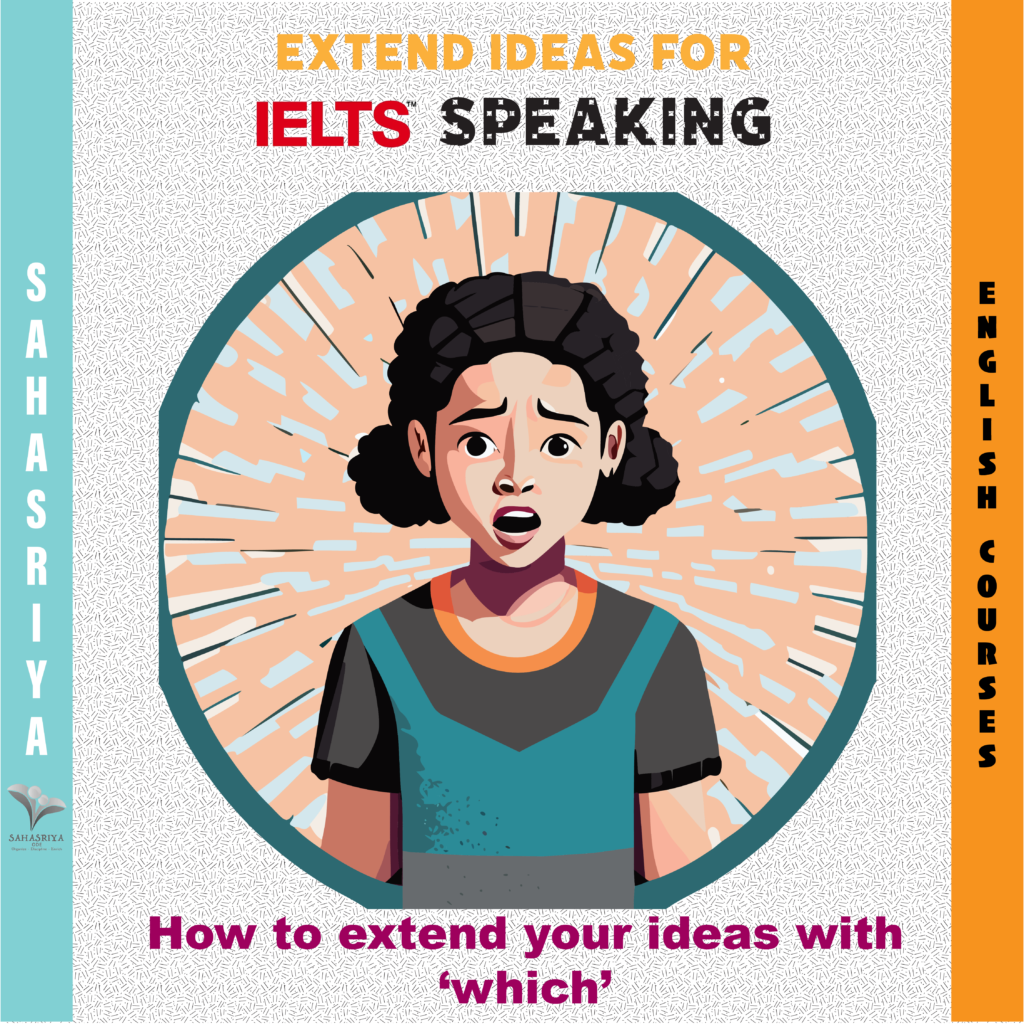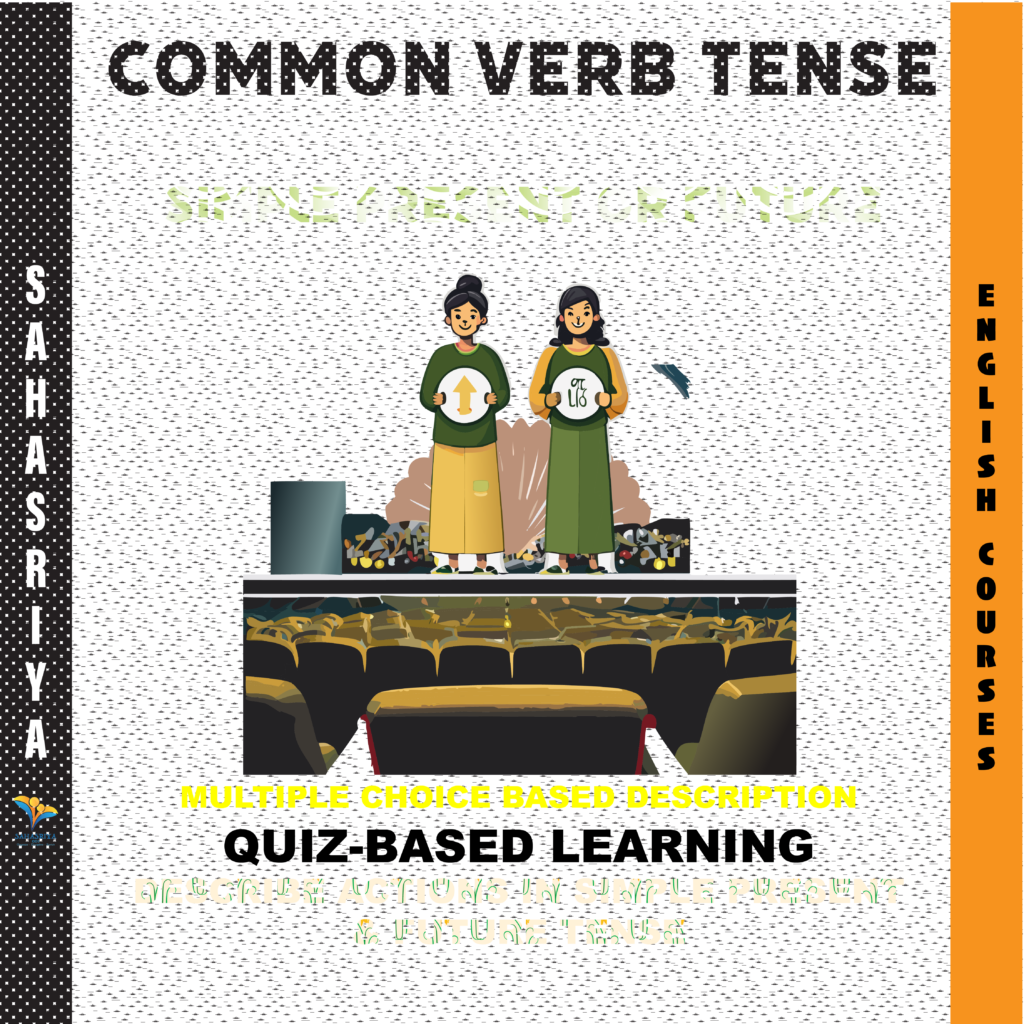
Do you know to extend your ideas with 'which'? Learn in an exciting way!
Many of our students ask, how can I extend my ideas during a speaking test or a public speaking programme. Well, we suggest one word that can help you do just that. It’s a very common word that we are sure you all know, but it’s very versatile and underused. That word is which, and today I’m going to show you how to use it better to help you express your ideas clearly.
Hello, and welcome back to another episode of Learn English with fun with Sahasriya. My name is Govind, and twice every week I focus on english grammar, vocabulary or pronunciation. And in this episode it’s all about vocabulary. Easy vocabulary that you can use to extend your ideas while speaking. It is about a simple word called… which
So many students think they need to learn new words to improve their English, and they’re not wrong. I have a rule of thumb, though, earlier when I was learning vocabulary, which I do even to this day is to use vocabulary to talk about your life and your experiences.
Now, there may come a time where you need to be more focused on more academic language. But for conversation, small talk at work, or a speaking competition for school-going learners, even some english texts, and even some english tests, more casual and conversational language will help you make a strong impression. But before we get going and learn some slick and easy new ways to learn the word which
Now, I said we’re going to learn some vocabulary, and that vocabulary is the word which, but which is also grammar, the word which is a pronoun and a determiner. What’s a determiner? Ummm… Determiner is a word in a sentence like which direction we should drive? Or which of you has a brown bag?. But what I want to look at is how to use the word which to show how we feel about something that happens.
In an english test or a speaking scenario, we often get asked to tell stories like maybe your teacher or your examiner might say, tell me about a situation where you were scared. Or tell me about your favourite teacher in high school. And my golden rule for students is very simple. Say what happened and say how you feel about it.
Let’s listen to a simple answer to the first question. Tell me about a situation where you were scared.
A few years ago we were driving on a highway in India. I was in Mumbai, and it can rain a lot. We had driven on this highway before, but never in a weather like this. This particular highway is a key transport route from Mumbai to the other cities in India. So there are a lot of trucks that use it. And that night there were a lot. The trucks sped by me in the rain, but we remained calm. We stayed focused on the road. After about 45 minutes, the rain eased and the trucks stopped coming.
Now, there’s nothing wrong with that answer, but listen again and see how much more detail I add this time.
A few years ago, I was driving on a highway in the rain. I was in Mumbai, and it can rain a lot, which is usually not a problem. But on this night, the rain was especially heavy. We had driven on the highway before, but never in weather like this. This particular highway is a key transport route from Mumbai to the other cities in India. So there are a lot of trucks that use it, which makes it a bit scary even when the weather is good. And that night there were a lot of trucks. The trucks sped by me in the rain, but we remained calm and we stayed focused on the road, which was very important because it’s a narrow stretch of
road and there are constantly accidents happening on it. After about 45 minutes, the rain eased up and the trucks stopped coming.
So, did you notice how I introduced the feelings? I added, which.
Let’s look at the first example. I was in Mumbai, and it can rain a lot, which is usually not a problem. But on this night, the rain was especially heavy.
So I added which, which was a pronoun for it can rain a lot in Mumbai. You see the word which is very versatile. It rains a lot in Mumbai, which surprises people when they arrive. Or it rains a lot in Mumbai, which makes the summer even pleasant because you appreciate it more. Or it rains a lot in Mumbai, which makes it difficult to get out of bed sometimes. So I’m adding some personal feelings about the situation, and I’m introducing them with which the word which is the determiner for the first sentence. It’s very useful.
So imagine it’s your speaking test, and you have to describe your opinion about a topic. Imagine they ask you if kids are getting enough exercise these days. You might say, kids don’t get enough exercise nowadays, which is sad, because I remember having a lot of fun playing sports during my elementary school days, and today the kids don’t seem to care.
Or you could say, no, they don’t, which is problematic because it may lead to poor health later in the life of kids if they don’t build the right habits. Or maybe you’re just talking about a movie or a tv show you like. You might say, I love the Netflix series Stranger Things. It’s a horror tv show based on old Stephen King movies, which is great because I loved those movies when I was a kid.
Or you might say, yes, I’m watching Gossip Girl, which is awful, but my mom is making me watch it. So which is great?
You can use it with phrases like which is great because or which is sad because or which is a problem because or which is really fun because and so on, to add your feelings about whatever you’re talking about. And that’s it. I hope you’ve enjoyed learning a fun and awesome way to use the word which. And if you ever want a bit more English practice before your English test, make sure you head to www.sahasriya.com or subscribe to Spotify Learn English with fun with Sahasriya podcast , which I strongly recommend.



